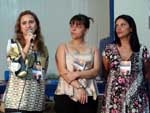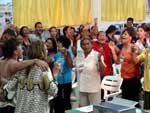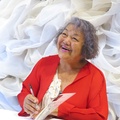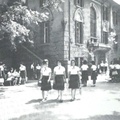>> 第4回
日本式助産の知恵を普及
「エ・プレシーゾ・サビ・ビビェール!」(生き方を知る必要がある)。全員が立ちあがり、手を叩きながら人間的出産のテーマ曲を合唱する。まるで 自己啓発セミナーか教会のミサのような賑やかさと活気にあふれている。アマゾナス州保健局とJICAの共催だが、堅苦しいセミナーとはほど遠い。
日本式の助産婦の保健知識、妊婦への心理的な支援方法を教える「第二回人間的出産セミナー」が、十月三十~三十一日にマニコレ市立展示場での行われた時の様子だ。
二十八時間離れた遠隔地コミュニティの地域保健員まで参加し、二百人以上が出産についての見識を深めた。
従来は、民間伝承の助産婦しかいなかった。船で七時間かかるフェラ・プレッタで助産婦をするネイラ・クルス・オリベイラさん(34)は二十歳の時から助産婦をし、すでに三十二人を取り上げたが、保健知識はなかった。「先輩を手伝っているうちにやり方を覚えた」という。
妊娠は病気でない。自然出産する妊婦を助けるのが助産婦の役割だ。伯国の都市部ではすぐに帝王切開する医師が多い。
このセミナーは、昨年本邦研修に行き、三カ月間、日本で助産婦のやり方を学んできた現役助産婦の伯人女性三人が企画した。JICAはフォローアップ事業として、研修内容を広めるOBの企画を後押しする。
マナウスの医療機関で働くマリア・グラシマ・フェクリ・ダ・ガマさん(41)、ロゼリー・セルケイラ・リラさん(47)、サンドラ・カバウカンチ・シルバさん(49)の三人の研修成果がこのセミナーによって何百人にも共有される。
第一回目は彼女たちが住むマナウスで約二百人を集めて行われた。今回がマニコレ、第三回はポルト・ベーリョで実施される。
会場の後方には、彼女たちが買ってきた日本人形や、日本で撮った写真が飾られ、参加者全員にきれいな箸が配られた。グラシマさんに聞くと、訪日中 にすべて企画購入したというから実に計画的だ。テーマ曲もわざわざセミナーのために作曲。伯人同士だけに、セミナーを盛り上げ説明するポイントをよく踏ま えた演出を考えている。
何が人間的(ウマニザソン)か。妊婦が苦しんで叫んでいても、「つくる時はさんざ楽しんだんだから、生む時は少しは我慢しなさい」などと助けないことが公立病院ではままあるという。
また、妊婦の子供が病室に母を訪ねることは一般的ではなかったが、セミナーでは妊婦心理の安定性を重要視して積極的に進めるなど意識改革的な部分が大きい。
またほとんど行われていなかったプレナタル(産前検診)の重要さも訴えられた。
セントロの医療施設でコーディネーターをするマルガリタ・ベルナルドさんは「面倒臭いと思って妊婦へ今まで詳しい説明をしなかったから、逆に余計な手間が生まれていたことが分かった。患者の話をよく聞き、よく説明する寛容さを持つことの重要性がよく分かった」という。
フェラ・プレッタから来たアナ・ルシア・フルタード・サントスさん(30)は「ここで学んだことを持って帰って、みんなに伝える」という。「保健 衛生知識が向上した。昔はすぐに投薬していたが、今では予防に力をいれるようになった」とHANDSの活動も高く評価している。
グラシマさんは「せいぜい五十人ぐらいの参加者かとおもったら二百人も集まってくれた。他の市にもこの運動を広げなくては」と意気込んだ。
フランシスコ会修道女として三年前から派遣されている、マニコレ唯一の日系人カナシロ・マリア・サチコさん(64、二世)は「ここの市民の現実 は、色々な意味で足りないことばかり。そんな中で定森はHANDSを通して、必要な知識を与える良い取り組みをしている」と語った。
※ 本稿はニッケイ新聞2008年12月2日に掲載されたものを許可を持って転載しています。
※ ニッケイ新聞(www.nikkeyshimbun.com.br)はブラジル国サンパウロ州サンパウロ市で発行されている、移住者や日系人・駐在員向けの日本語新聞です。
© 2008 Nikkey Shimbun








